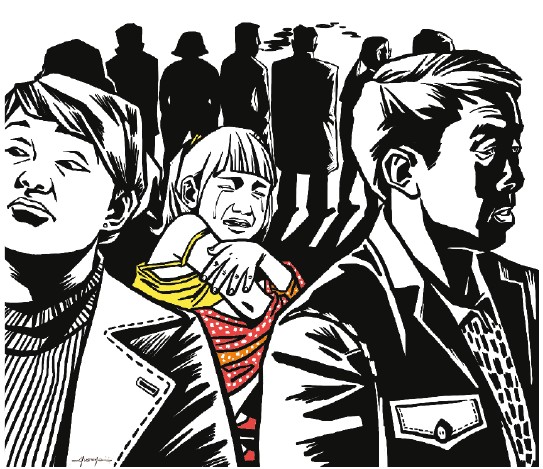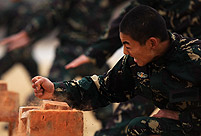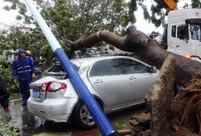 |
When prosecuting and public security authorities jointly released an order on Oct 24 stipulating harsher punishment for perpetrators of sexual assault against minors under 12, the move was greeted with enthusiasm from the public. But experts warn that sex education is still urgently needed to protect children from being abused.
This year, news headlines have been dominated by stories of children, both girls and boys, being sexually abused, mostly by teachers and acquaintances.
Although there are no national statistics, in Guangdong alone, more than 2,500 girls, half of them under the age of 14, have been sexually abused over the past three years, according to China News Agency.
Studies have found that one reported child sexual abuse case represents six to seven unreported incidents, according to Liu Fengqin, a psychiatrist with the Maple Women's Psychological Counseling Center, a non-government organization which provides psychological intervention to women and children suffering from sexual abuse and domestic violence.
But the thing that concerns Liu the most is how unprepared parents and children are to deal with child sexual abuse.
"Our society is too shy when it comes to talking about sex. Children generally receive no sex education, and teachers even avoid telling students about reproduction in textbooks," Liu says.
"How can children protect themselves if they have no idea of what is happening when someone sexually abuses them?"
At least one fourth of women seeking help from her have been sexually abused as children. Some victims didn't even understand what had happened until they grew up, Liu adds.
One of the victims Liu has helped is a girl in Hunan province, who was identified as Si Si in media reports. Si Si became the center of a national scandal when she had a baby at age 12.
Earlier this year, as her stomach became bigger, Si's parents took her to a local hospital, thinking she had a tumor.
They were shocked to find that the girl had been pregnant for six months.
The father was angry, considering the pregnancy a disgrace, and decided to take Si to a local hospital for an abortion.
But when they went to a family planning service center for an abortion days later, the doctor called the police upon finding the pregnant girl was only 12.
Si then claimed that three teachers in her school and an old man in the village had raped her, several times.
However, in eyes of the villagers, Si was the one to blame, according to Liu Fengqin, who came to the family's aid after reading the media reports.
"Villagers don't believe the old man and teachers raped her," Liu says.
"They believe the girl had sex with the old man voluntarily, and they blame the parents for not making the girl behave."
Even when some villagers showed sympathy, the victim was stigmatized.
"They worry about the girl's future as if she has been ruined and wasted," Liu says. "They think the girl is not pure anymore, because she will not lose her virginity to her husband on her wedding night, even though that is because she was raped."
Fang Gang, a sexologist with Beijing Forestry University, emphasizes the harm such beliefs can do.
In a society that values virginity so much, victims of child sexual abuse often dare not expose the crime, leaving the abusers at large, Fang says.
Even if the abusers are punished by law, the victims can no longer live as they used to, because society stigmatizes them and their families, Fang notes.
Xi Xiaohua, director of the Beijing Youth Legal Aid and Research Center, says when the center provides legal help and psychological consulting to sexually abused children, many parents are uncooperative, and avoid discussing the issue with them.
It has often happened that when the children finally started trusting Xi and her colleagues, and were willing to recall and talk about their experience, which was an important part of psychological intervention and recovery, their parents would become alerted, and prevent Xi and her colleagues from proceeding.
Liu Fengqin, the psychiatrist, says many women she has helped try to hide their experience of sexual abuse from others, including their parents, and suffer from mental illness in adulthood, such as depression and fear of intimacy.
"Being sexually abused is a tragedy, and no one wants that to happen to children," Liu says.
"But the reality is children know little about what sexual abuse is or how it will affect their life. They learn about that from people around them, mostly from their parents' behaviors.
"If people around them treat them as if they are different or should be ashamed, such kind of hurt is even stronger than sexual abuse itself."
Thanks to the help of several organizations, Si Si has been relocated to a place where she does not know anyone, but her family still live with constant anxiety and fear, according to Liu.
Fang Gang, the sexologist, suggests teaching children sex education that makes them understand the importance of their bodies, and have complete autonomy over their bodies. That is to say, society should not judge anyone on their sexual activities as long as they don't interfere with others' rights.
"Our society puts female virginity under the microscope for judgment, but doesn't provide sex education to children," says Fang Gang. "It is completely wrong."
 Luxury-cars parade held in Dubai
Luxury-cars parade held in Dubai Special forces take tough training sessions
Special forces take tough training sessions Fire guts 22-storey Nigeria commercial building in Lagos
Fire guts 22-storey Nigeria commercial building in Lagos Singles Day:
Singles Day:  Temperature drops dramatically in Beijing
Temperature drops dramatically in Beijing Typhoon Haiyan hits south China's Hainan
Typhoon Haiyan hits south China's Hainan Top 10 celebrity moms in China
Top 10 celebrity moms in China Weekly Sports Photos:
Weekly Sports Photos: Gingko leaves turn brilliant golden yellow in Beijing
Gingko leaves turn brilliant golden yellow in Beijing Maritime counter-terrorism drill
Maritime counter-terrorism drill Love searching stories in cities
Love searching stories in cities Male belly dancer in women’s fitness club
Male belly dancer in women’s fitness club  15 best rivers for travelers in world
15 best rivers for travelers in world National Geographic Traveler Photo Contest
National Geographic Traveler Photo Contest Weekly Sports Photos
Weekly Sports PhotosDay|Week|Month